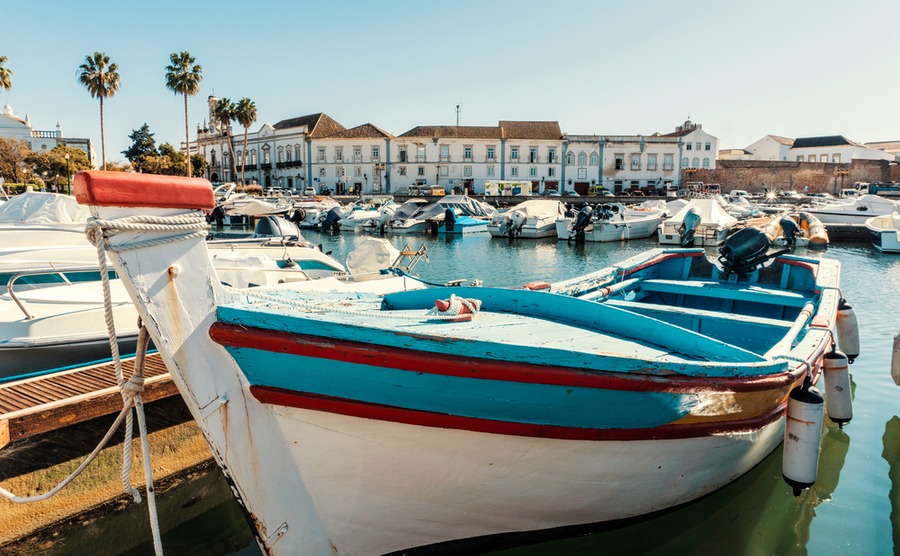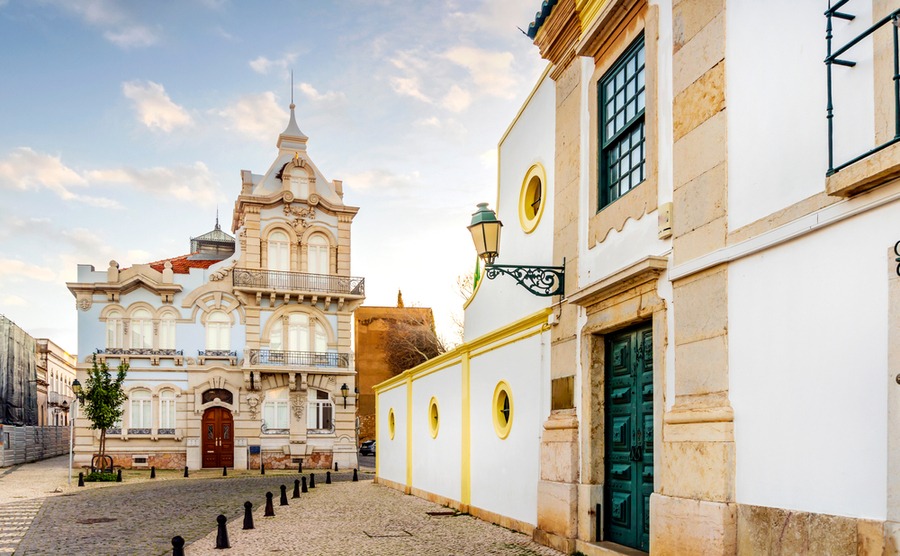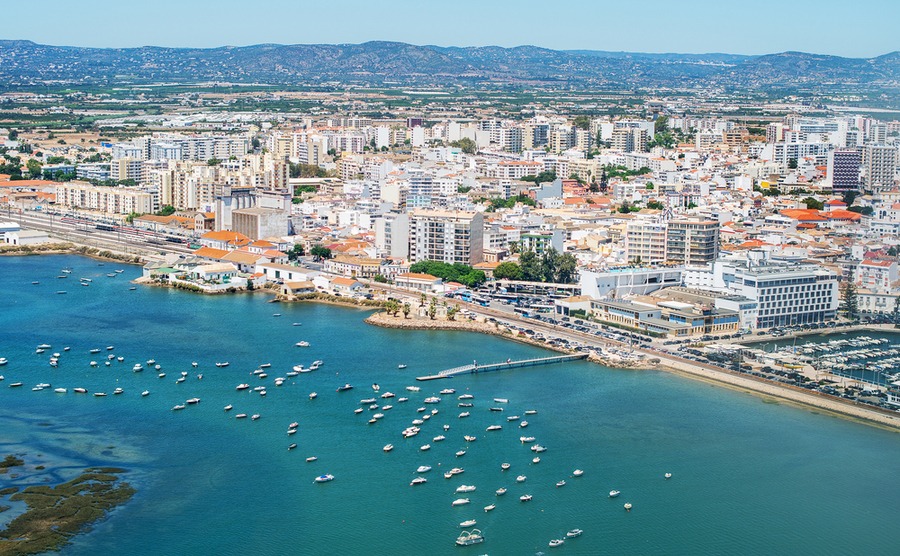Many people pass through Faro when visiting the Algarve but don’t check out the city. Once you discover its charms, you may even consider moving to Faro!
Faro is the “capital” of Portugal’s Algarve, and home to the region’s busy international airport. Many people pass through Faro en route to resort areas, remaining blissfully unaware of the attractions of the city. In this article we look at the city’s many charms, and discuss the prospect of moving to Faro itself.
Find your dream home in Faro via our property portal.
With a population of just over 60,000 people, Faro is a relatively small city. Its atmosphere is laid-back and low-key. Tourists do visit, and there are some shops, restaurants and boat-rides aimed specifically at them. However, Faro generally feels like an authentic working Portuguese city, and a real contrast to some of the purpose-built resorts just to the west.
Let’s take a look at what to expect. If you like what you see, you can also search property for sale in Faro on our fantastic property portal.

Faro Old Town
Getting There
Starting with a major plus, Faro is THE best connected place in all of the Algarve. First off, it’s where the airport is (just a ten minute drive from the city centre). This is a huge benefit of moving to Faro for holiday home owners or even long-distance commuters. You can disembark the plane, and be at home or in your favourite bar 30 minutes later!
Faro is at the centre of the Algarve’s main train line, and the station is also the terminus for fast Alfa Pendular trains to Lisbon, Porto and beyond. Similarly, Faro bus station has frequent services to all Algarve destinations, as well as coaches to Seville.
Finally, Faro is smack bang in the middle of the region’s road network. Both the A22 motorway and the main N125 Algarve road skim the city. You’re also within easy reach of the fast A2 toll road up to Lisbon.
The sand is still in easy reach, but so is the atmosphere of a small, authentic city.
The Two Sides of Faro
You can broadly divide Faro into two halves: First, there’s the “old town” area, which is the city itself. The centre piece is a small, attractive marina, with restaurants, stalls, and ferry services to nearby island beaches. Throughout a typical year, plenty of festivals and fairs appear in this area.
Get your free copy of the Portugal Buying Guide – your free guide to everything you need to know about buying in Portugal.
Just east of here is the attractive walled area of the city, and behind is a network of mostly-cobbled streets. Here, occasional souvenir shops blend in with plenty of local stores aimed more at Faro’s permanent population. Plenty of small cultural attractions are tucked away, including several museums, many churches, and the stunning Teatro Lethes theatre.
If a wander around Faro’s old town leaves you questioning where all of the brand names and chain stores are, you’ll find your answer in the newer part of town. As you reach the outskirts, towards the airport, you find the Forum Algarve shopping mall. This is a vast complex with an enormous supermarket, a cinema, and dozens of stores and restaurants.
There are several other retail parks in this area too, along with DIY stores, garden centres and other outlets. This part of Faro is a magnet for people from all over the Algarve.

You can broadly divide Faro into two halves.
Geography and Weather
Faro enjoys the typical Algarve climate, with over 300 sunny days each year. In the peak summer months, it’s fair to say that you will notice the heat in the city centre, and understand why the plush, air conditioned shopping mall is so popular!
Situated right in the middle of the Algarve, the coastline has more in common with the east of the region than the west. This is an area where you find vast island beaches, usually reached by ferry.
The closest beach to the city is Praia de Faro, accessed via a narrow bridge near the airport. It’s very popular with locals, and broadly overlooked by tourists. The exception are those fortunate enough to discover it’s a good place to stop off before a flight home.
With interest rates falling even lower, borrowing money to pay for a home in Portugal makes even more sense. See how in your free guide, How to Pay for a Property in Portugal.
Jobs
While the usual caveats apply – such as the benefit of being fluent in Portuguese – moving to Faro places you in as good a position as any if you need to find work.
The main reason for this is the proximity of the airport. The airline industry creates a diverse range of jobs, both with the airlines and holiday companies, and within the wider infrastructure around them. The University of the Algarve could also offer some possibilities for academics.
Get your Faro property search underway here.
Living in Faro
The broad split between the older and newer parts of Faro continues when it comes to property.
In the old town, you can still find traditional townhouses and even some renovation projects. In the immediate surroundings there are lots of (mostly older) apartment complexes. These could provide an inexpensive (and extremely convenient) city bolthole.
As you move a little further out into suburbs like Gambelas (also home to one of the region’s largest private hospitals), you find lots of modern developments. These are much like the complexes located in the Algarve’s touristic regions, and there are often pools and other communal facilities.

The sand is still in easy reach, but so is the atmosphere of a small, authentic city.
However, you’re much more likely to be sharing the facilities with working professionals, young families and other permanent residents. Some of these areas don’t offer a huge amount, beyond housing and a few local shops and restaurants. However, all parts of the city are in very easy reach, with frequent busses and very little traffic.
• Older apartments in downtown Faro start at just €135,000, with townhouses for renovation at a similar cost.
• Modern condominium apartments start at around €190,000.
• Houses from around €275,000.
Our currency partner Smart Currency Exchange has an office in Vilamoura. They’re the experts on property transactions, so do read their guide, The Property Buyer’s Guide to Currency.
Faro may not be a particularly obvious choice in the Algarve, but it is – in many ways – a ‘best of all worlds’ location. It’s especially well suited to those more interested in culture and wider travel than simply loafing on a beach. The sand is still in easy reach, but so is the atmosphere of a small, authentic city.
And for those seeking a second home in Portugal, there’s no location more convenient as a “lock up and go.”
So next time you visit the Algarve, make sure that you check out more of Faro than just its airport. You may find that moving to Faro becomes something you start to consider.











